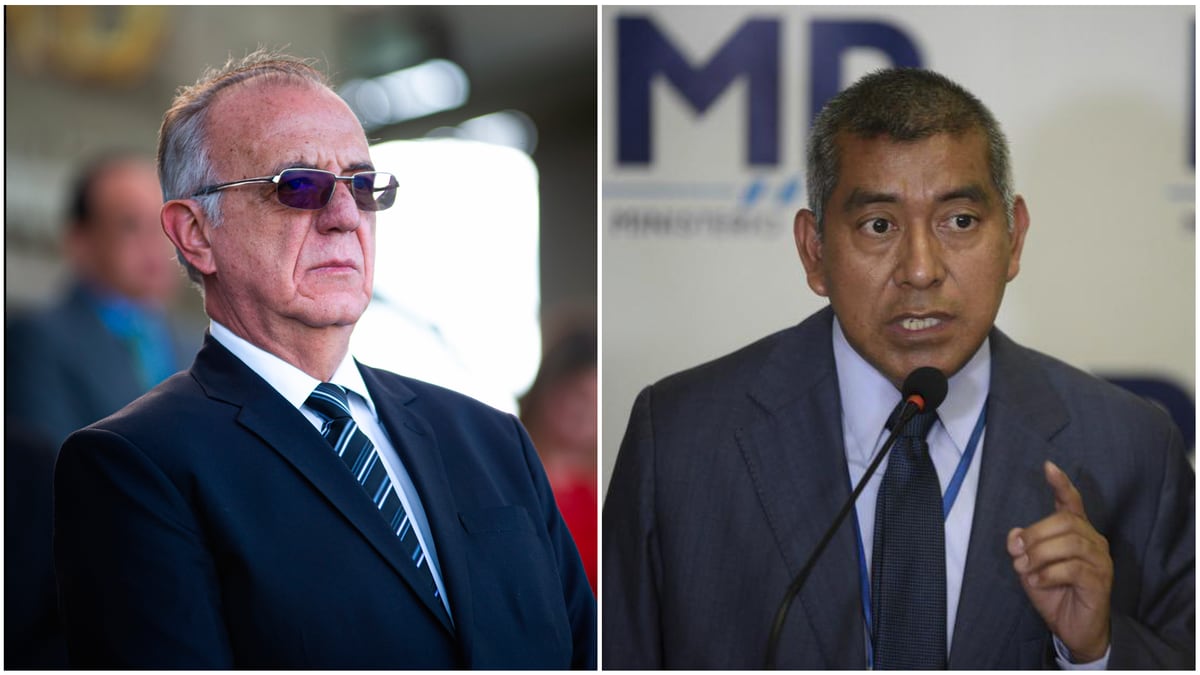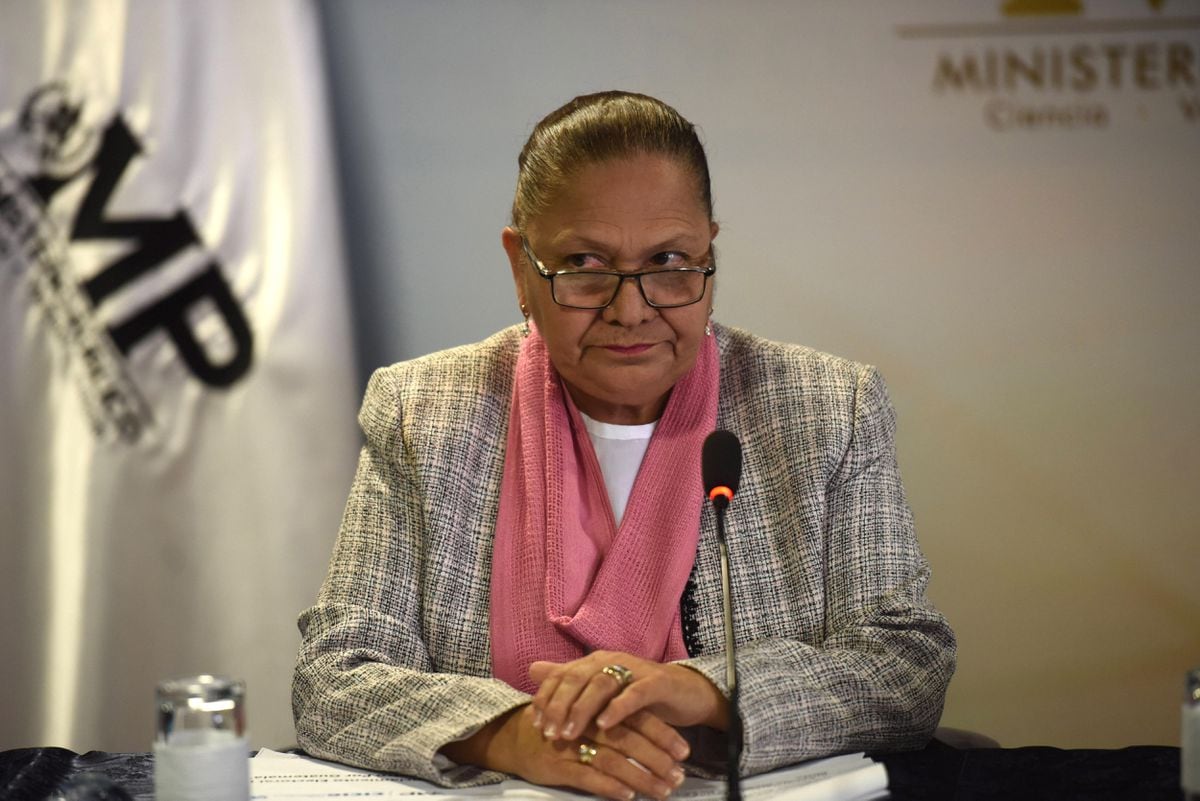The new case that the Guatemalan Prosecutor's Office opened this Monday against the Colombian Defense Minister, Iván Velásquez, has almost no chance of prospering, but the announcement says more about the deep crisis of corruption within the Guatemalan judicial system than about the defendant.
In addition, with this move, the Central American country's Prosecutor's Office further escalates this crisis that started with a national dimension but is increasingly spreading internationally.
The criminal case against Velásquez is difficult for the Guatemalan Prosecutor's Office for several reasons.
First, because as the former head of the International Commission against Impunity in Guatemala (CICIG), an organization that was supported by the UN, Velásquez had immunity to work freely, as did those who investigated with him.
Second, because the now Colombian Defense Minister has the unconditional support of President Gustavo Petro.
"I will never accept the arrest warrant for our minister Velásquez," said the president.
Third, and most important, because the legal case has no hard evidence against him.
In his statement to the media, Guatemalan prosecutor Rafael Curruchiche says that Velásquez had "full knowledge of the dark or corrupt negotiations that were taking place with the Odebrecht company."
For that, he shows a series of emails that do not show any criminal attitude.
What they show is that Velásquez was being informed, and giving his approval, so that legal cooperation agreements could be carried out with former directors of the Odebrecht construction company.
Such arrangements have been customary and legal in several countries: information is sought on those who have paid bribes in the country in exchange for certain privileged legal treatment.
And in the case of Guatemala, in addition, these agreements were endorsed by the Supreme Court of Justice.
"That they accuse him of obstructing justice is a case that has neither tail nor tail," Juan Pappier, acting deputy director of the Americas division of Human Rights Watch, told EL PAÍS.
Pappier explains that the Guatemalan Public Ministry canceled this cooperation agreement, last year, "with absurd legal arguments, and now they persecute those who investigated and release those investigated."
Among those released are the former communications minister, Alejandro Sinibaldi, and former presidential candidate Manuel Baldizón, both accused of receiving millions of dollars in bribes from Odebrecht in exchange for awarding projects to the construction company.
Pappier insists that beyond the Iván Velásquez case, with little chance of success, the Prosecutor's announcement this Monday is worrying for "Guatemalans who are subject to persecution by a judicial system co-opted by corrupt interests."
Prosecutor Curruchiche also announced an arrest warrant, already approved by a judge, against the following four citizens: Thelma Aldana, former attorney general;
Mayra Véliz, former secretary of the Public Ministry;
David Gaitán, former CICIG official;
and Juan Pablo Carraso, president of the American Chamber of Commerce in Guatemala and honorary consul in Bulgaria.
Several of them now live outside of Guatemala.
Aldana, one of the most recognized jurists against corruption, has lived in exile since 2019.
David Gaitán, for his part, now works with the renowned NGO Transparency International, an institution that defends the rule of law and has already ruled against the Guatemalan Public Ministry.
“Transparency International demands that Guatemala immediately drop the charges against these anti-corruption advocates,” a statement read.
“Especially because the government signed an international and legal agreement that provided immunity to all CICIG members, the charges against David Gaitán must be dropped.
We ask the UN to demand from the government its commitments to protect those fighting against corruption in the CICIG”.
The UN has not yet ruled, but Brian Nichols, the US Under Secretary of State for the Western Hemisphere, did.
“Concerned about the arrest warrants from the Guatemalan Public Ministry against people who worked to guarantee accountability for corruption in the Odebrecht case in Guatemala.
Such actions undermine the rule of law and trust in the Guatemalan judicial system,” he wrote on his Twitter account.
And it is that the system of corruption in Guatemalan justice, which has now generated a diplomatic crisis with Colombia, has been in the sights of the United States for some time.
In 2022, the prosecutor in the case, Rafael Curruchiche, was included in a list of the US Government that indicates people who have "threatened democratic institutions or processes, have been involved in significant acts of corruption or have obstructed investigations of those acts of corruption." in Guatemala, Honduras and El Salvador.
His boss, Attorney General Consuelo Porras, is also on that list.
Curruchinche also led last year the criminal proceedings against José Rubén Zamora, renowned journalist and founder of
elPeriódico,
a case without foundation that was internationally condemned
.
The judge who approved the arrest warrants on Monday, Carol Patricia Flores, was also accused of corruption in 2018: the CICIG then asked to remove her immunity to investigate her for money laundering and illicit enrichment.
Who could be behind these new investigation and arrest warrants against Velásquez and the five Guatemalans?
The corruption of the judicial system does not have a single head, agree three experts in Guatemala that EL PAÍS consulted, and the enemies that anti-corruption prosecutors have are infinite.
What is behind it is what is called the "corrupt pact": an agreement between businessmen, politicians and the military to stop or reverse the investigations against them, and take revenge on those who promoted them in the past decade.
This pact has more than 35 anti-corruption prosecutors and judges in exile, most of them because the Public Ministry has opened spurious investigations against them.
"Almost the entire justice system has been taken over by the pact, but it is not easy to know who is the brilliant mind that handles cases like these, because a brilliant mind obviously wants to stay in the shadows," Alejandra Gutiérrez, a journalist and director of Agencia Ocote.
In 2015, the Central American country was experiencing what was called the "Guatemalan spring": the CICIG accused then-president Otto Pérez Molina and his vice-president Roxana Baldetti of corruption, and a series of protests managed to remove Molina from office.
The CICIG also accused several businessmen, ministers, legislators, even the family of former President Jimmy Morales in 2018—it seemed that Guatemala was on its way to defeating corruption at the hands of courageous judges and prosecutors unafraid of investigating power.
But what happened was completely the opposite.
Morales expelled Velásquez from Guatemala in 2018 and demanded the cessation of functions of the CICIG in 2019. "Then an exercise of revenge began, or to try to maintain the
status quo
, and that
status quo
is that of impunity," he says Gutierrez.
In 2018 Consuelo Porras joined the Public Ministry and since then spurious investigations against anti-corruption judges and prosecutors have increased—her term of office was renewed in 2022 by the current president, Alejandro Giammattei, who has ignored the United States accusations against Porras.
The Ocote Agency recently published an investigation showing that "two dozen lawsuits against officials who investigated and prosecuted corruption cases" were filed by a right-wing organization in defense of the military: the Fundación Contra el Terrorismo (FCT).
The complaints, the investigation explains, did not usually prosper in the first years since the FCT was founded, in 2013, but "the fate of their requests changed during the administration of Consuelo Porras as attorney general, and after the departure of the CICIG , and the new formation of the Constitutional Court”.
However, it is currently not possible to know if in this case it is also the FCT that is behind the five arrest warrants and the investigation of Iván Velásquez.
"It is not possible because Iván Velásquez and they touched so many interests, political, business, that it could be anyone," says an investigator of these spurious cases who prefers not to reveal his name.
Given this panorama, new legal cases will hardly have a fair path, but the crisis in the Guatemalan justice system is becoming ever deeper, both inside and outside the country.
Subscribe here
to the EL PAÍS newsletter on Colombia and receive all the latest information on the country.


/cloudfront-eu-central-1.images.arcpublishing.com/prisa/34ZR4HH37ALPAI5BSQHC3V42QE.jpg)
/cloudfront-eu-central-1.images.arcpublishing.com/prisa/TSUEZ7K7S5HNDE7GY53532ZZ7A.jpg)

/cloudfront-eu-central-1.images.arcpublishing.com/prisa/EWJ6D24N4FAMNMM5L7QDF7NQFM.jpg)
/cloudfront-eu-central-1.images.arcpublishing.com/prisa/7ZSE2B3NHBCBXJUKMVDIJEMBHI.jpg)


/cloudfront-eu-central-1.images.arcpublishing.com/prisa/66E5ZJUDZGT5AWIW7USKEZRE4A.jpg)